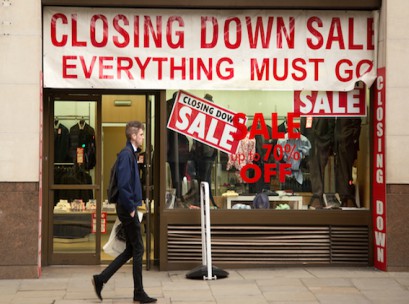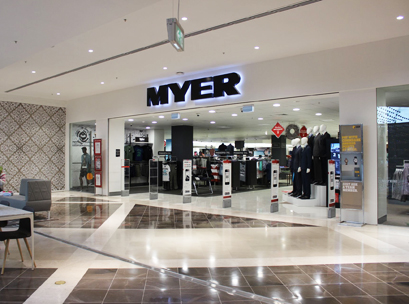 The list of some of the biggest names in traditional retail in Australia and the rest of the world that have trimmed, or have announced plans, to reduce their footprint is getting longer amid slumping sales and increased competition from online sellers.
The list of some of the biggest names in traditional retail in Australia and the rest of the world that have trimmed, or have announced plans, to reduce their footprint is getting longer amid slumping sales and increased competition from online sellers.
Speaking to Inside Retail, IBISWorld industry analyst Sam Johnson said the shift toward online shopping is making it increasingly difficult to compete, particularly on price and convenience, for traditional bricks and mortar stores, so more store closures or downsizing are still to be expected in the coming months.
“The scale of larger e-commerce operators like Amazon provides a one-stop-shop experience to buy a range of goods,” Johnson said.
“Traditional retailers that are unable to compete with the prices of these large operators are being forced to downsize or close up shop.”
Johnson said domestically, weak consumer sentiment and discretionary incomes are constraining retail spending, which is further contributing to the challenging retail environment.
According to Johnson, the trends affecting the US department store sector are similar to what Australian department stores and the wider Australian retail sectors are going through.
“Price competition, the shift towards online, increasingly price-conscious consumers, and the lower overheads of online businesses are all creating an environment that is highly competitive and forcing inefficient smaller operators to exit the industries,” he said.
Retailers that have announced sweeping closures this year include Macy’s, J.C. Penney, Sears and Kmart. In Australia, Specialty Fashion Group, the owner of Katies, Millers and Rivers, announced plans to close over 300 stores as the company embarks on a “wide-ranging business program” focusing on store rationalisation and accelerating its e-commerce channels.
Menswear brand Rhodes & Beckett has closed eight concession outlets in Myer before it was bought by a firm that is being backed by a Hong Kong-based private equity company.
Myer has trimmed a total of 74,670 sqm of retail floorspace since September 2015 in its bid for a sustainable store network. The department store retailer announced on September 18 its plans to close a further three stores, Colonnades in South Australia, Belconnen in the ACT, and Hornsby in Sydney’s north.
Marcs and David Lawrence announced store closures in New Zealand at the time it was trying to find a buyer for the retailer’s remaining Australian stores. The high street fashion retailer has already closed 13 stores in Australia after going into voluntary administration on February 1, before Myer stepped into salvage the business.
Topshop/Topman’s locations in Miranda, Chatswood, Perth, Highpoint and Chapel Street shut down in July and closed its stores in Auckland and Wellington last September before Sir Philip Green and his UK-based Arcadia Group stepped in to rescue the Aussie business.
According to Johnson, retailers are now increasingly needing to differentiate their products and their shopping experience to attract customers, in fact, they need to.
 “Additionally,” he said, “retailers that are better able to compete based on quality and through a more-diversified service offering to move away from competing solely on price are more likely to flourish in the current retail climate.”
“Additionally,” he said, “retailers that are better able to compete based on quality and through a more-diversified service offering to move away from competing solely on price are more likely to flourish in the current retail climate.”
Big W closed two stores in FY17 but opened one.
Canadian fashion retailer Kit and Ace announced last May 1 it was closing its seven Aussie stores across Victoria, New South Wales and Queensland after appointing Deloitte as voluntary administrators. The luxury womanswear label said it is ‘simpifying its business plan and operations,’ and in order to reduce its head office staff is closing its showrooms within international markets in the US, Australia and UK. The retailer will instead turn its focus to its Canadian showrooms and global e-commerce platform.
America’s shrinking Sears, which announced in June it would shutter 150 stores, announced more store closures earlier this month. Of the latest batch, 45 stores are Kmarts and the balance Sears branded. Located mostly in the midwest and south of mainland US, they will close in January, after the Thanksgiving and Christmas trading seasons.
UK department store chain Marks & Spencer announced plans of shutting more stores along with reduced profits amid worsening high-street trading conditions.
Clothing and accessories retailer Michael Kors announced it intends to close between 100 to 125 of its full-price retail stores over the next two years as it intends to improve profitability of its store fleet. The struggling US apparel retailer Bebe has closed all of its 180 stores last May, following four years of losses.
The fashion retailer French Connection has closed nine underperforming stores in the UK, Europe and North America in the period.
American retail giant Macy’s Inc. has announced last January the closure of 68 stores as part of a plan to streamline its store portfolio and increase cost efficiency.
Cathryn Carver, executive general manager, National Australia Bank, said the world is undergoing a digital transformation where no sector is immune.
“With technology developing at an unprecedented pace and customer expectations constantly evolving, business survival is dependent on understanding and adapting to this changing landscape.”
Access exclusive analysis, locked news and reports with Inside Retail Weekly. Subscribe today and get our premium print publication delivered to your door every week.





